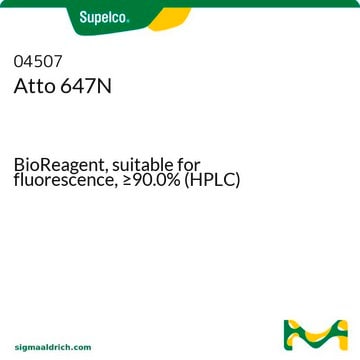68499
Atto 532 maleimide
BioReagent, suitable for fluorescence, ≥90% (coupling to thiols)
Sign Into View Organizational & Contract Pricing
All Photos(1)
About This Item
Recommended Products
product line
BioReagent
Quality Level
Assay
≥90% (coupling to thiols)
form
powder
manufacturer/tradename
ATTO-TEC GmbH
fluorescence
λex 532 nm; λem 553 nm in 0.1 M phosphate pH 7.0
suitability
suitable for fluorescence
storage temp.
−20°C
Application
Atto fluorescent labels are designed for high sensitivity applications, including single molecule detection. Atto labels have rigid structures that do not show any cis-trans-isomerization. Thus these labels display exceptional intensity with minimal spectral shift on conjugation.
Legal Information
This product is for Research use only. In case of intended commercialization, please contact the IP-holder (ATTO-TEC GmbH, Germany) for licensing.
Not finding the right product?
Try our Product Selector Tool.
Storage Class Code
11 - Combustible Solids
WGK
WGK 3
Flash Point(F)
Not applicable
Flash Point(C)
Not applicable
Choose from one of the most recent versions:
Already Own This Product?
Find documentation for the products that you have recently purchased in the Document Library.
Roland Bienert et al.
Chemphyschem : a European journal of chemical physics and physical chemistry, 12(3), 510-517 (2011-02-03)
H(+)-ATP synthases are molecular machines which couple transmembrane proton transport with ATP synthesis from ADP and inorganic phosphate by a rotational mechanism. Single-pair fluorescence resonance energy transfer (spFRET) in single molecules is a powerful tool to analyse conformational changes. It
Chunlai Chen et al.
Nucleic acids research, 35(9), 2875-2884 (2007-04-14)
Hybridization of nucleic acids with secondary structure is involved in many biological processes and technological applications. To gain more insight into its mechanism, we have investigated the kinetics of DNA hybridization/denaturation via fluorescence resonance energy transfer (FRET) on perfectly matched
Toshiro Saito et al.
Nanotechnology, 22(44), 445708-445708 (2011-10-13)
We fabricated platinum bowtie nanostructure arrays producing fluorescence enhancement and evaluated their performance using two-photon photoluminescence and single-molecule fluorescence measurements. A comprehensive selection of suitable materials was explored by electromagnetic simulation and Pt was chosen as the plasmonic material for
STED microscopy reveals nanoparticle assemblies
Willig, K.I., et al.
New Journal of Physics, 8, 1-1 (2006)
Evidence for major structural changes in subunit C of the vacuolar ATPase due to nucleotide binding.
Andrea Armbrüster et al.
FEBS letters, 579(9), 1961-1967 (2005-03-29)
The ability of subunit C of eukaryotic V-ATPases to bind ADP and ATP is demonstrated by photoaffinity labeling and fluorescence correlation spectroscopy (FCS). Quantitation of the photoaffinity and the FCS data indicate that the ATP-analogues bind more weakly to subunit
Our team of scientists has experience in all areas of research including Life Science, Material Science, Chemical Synthesis, Chromatography, Analytical and many others.
Contact Technical Service




